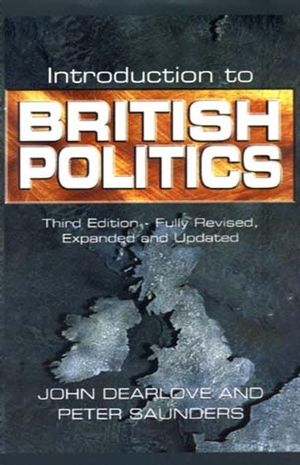Introduction to British Politics, 3rd Edition, Completely Revised and UpdatedISBN: 978-0-7456-2095-4
Hardcover
824 pages
December 2000, Polity
 This is a Print-on-Demand title. It will be printed specifically to fill your order. Please allow an additional 10-15 days delivery time. The book is not returnable.
|
||||||
1. Introducing British Politics.
What is Power?.
Perspectives on Political Power.
What is Britain?.
Organization of the Book.
References and Guide to Further Reading.
Part I: The Constitutional System, Political Parties and Elections..
2. The Changing Constitution and the Rules of the Political Game. .
Introduction.
The Constitution and State Power.
What is the British Constitution?.
How to Study the Constitution.
The Origins of the Constitution.
The Balanced Constitution.
The Liberal Constitution.
The Liberal-Democratic Constitution: Representative Democracy.
Conclusion.
References and Guide to Further Reading.
3. The Party System, Political Parties and Party Funding.
Introduction.
The Functions of the Political Parties.
The Classification of Party Systems.
The British Party System.
Party Development and Social Cleavages.
Party Organization.
British Political Parties.
Party Funding.
Conclusion.
References and Guide to Further Reading .
4. Choosing our Leaders 1: The Sociology of Voting. .
Introduction.
Voting Studies.
Party Identification Theory and Social Class.
Dealignment and 'New' Cleavages.
Conclusion.
References and Guide to Further Reading .
5. Choosing our Leaders 2: The Economics, Geography and Politics of Voting.
Introduction.
The Economics of Politics: Public Choice Theory and Rational Choice.
The Geography of Voting.
The Politics of Voting: Labour and the 1997 General Election.
Conclusion.
References and Guide to Further Reading .
Part II: Pressures, Power and the State. .
6. Influencing our Leaders: Perspectives on Interests and Groups. .
Introduction.
Interest Group Concepts.
Classic Pluralism: Perfect Competition.
Imperfect Competition.
Neopluralism.
Hyperpluralism and Demand Overload.
Corporatism: Closed Competition.
New Social Movements and Direct Action.
The Problem of Collective Action.
The Problem of Insider Lobbying by MPs.
Conclusion.
References and Guide to Further Reading .
7. The Central State.
Introduction.
The Civil Service.
The Bank of England.
The Armed Forces.
The Security Services.
The Judiciary.
Conclusion.
References and Guide to Further Reading.
8. Beyond the Central State: Local, Regional and Devolved Governance.
Introduction.
Local Government.
Quangos.
Regional Administration and Government.
Devolution and National Government.
Conclusion.
References and Guide to Further Reading.
9. Who Really Runs Britain?.
.
Introduction.
Is There a British Power Elite?.
Is There a Ruling Class in Britiain?.
Systemic and Institutionalized Power.
Conclusion.
References and Guide to Further Reading.
Part III: Ideas and Issues. .
10. Beyond Left and Right?.
.
Introduction.
Old Labour and the Pursuit of Socialism.
Conservatism and the New Right.
The Birth of New Labour.
Conclusion.
References and Guide to Further Reading.
11. The Constitution as an Issue. .
Introduction.
Towards Constitutional Crisis.
Constitutional Criticisms.
Constitutional Changes.
Conclusion: Constitutional Futures.
References and Guide to Further Reading.
12. Managing the Economy.
Introduction.
The Long-Term Decline of the British Economy.
The Golden Age of Liberalism: From the Great Exhibition to the Great War.
The Retreat from Liberalism: From the Great War to the Great Depression.
Nationalization and Economic Planning: the War and the Postwar Labour Government.
Demand Management: The Mixed Economy and the Long Postwar Boom.
Corporatist Planning: 1962-1979.
The Return to a Market Strategy: Thatcherism.
After Thatcher: Economic Policy in the 1990s.
Conclusion.
References and Guide to Further Reading.
13. The Rise and Fall of the Welfare State?.
Introduction.
Before the Welfare State.
The Development of the Welfare State.
The Welfare State Under Attack.
Thatcher, Major and the Marketization of Welfare.
New Labour and Welfare Reform.
Conclusion.
References and Guide to Further Reading .
14. Maintaining Civil Society.
Introduction.
Is There a Dominant Ideology?.
The Traditional Agencies of Socialization and Informal Social Control.
'Modern' Agencies of Socialization and Social Control.
The Dominant Ideology Thesis Revisited.
Enforcing Order: Policing, Crime and the Authoritarian State.
Conclusion.
References and Guide to Further Reading.
Part IV: Britain and the World. .
15. Globalization and the Autonomy of the British State. .
Introduction.
Globalization.
A Global Economy?.
The Decline of the Nation-State?.
Can Nation States Still Make a Difference? The Sceptical Challenge.
International Organizations.
Conclusion.
References and Guide to Further Reading.
.
16. The European Union: A New Superstate?.
Introduction.
History.
Institutions and the Policy-Making Process.
Revenue and Expenditure.
The Single Currency and the Question of National Sovereignty.
Federalism, Sovereignty and the Democratic Deficit.
Why Has Britain been such a 'Bad European'?.
Conclusion.
References and Guide to Further Reading .
17. Concluding Remarks .
Introduction.
How is State Power Formally Organized?.
Who Runs or Influences the State?.
What are the Outputs from the State and Who Benefits?.
What are the External Constraints on the State?.
Conclusion: Muddling Through? .
Glossary.
Acknowledgements.
Index.



